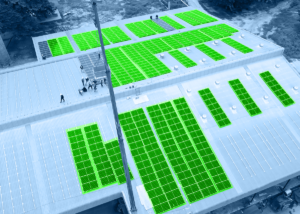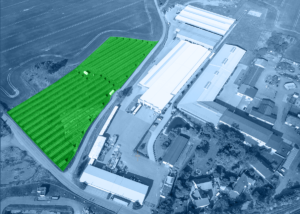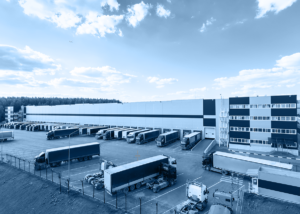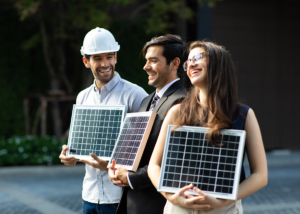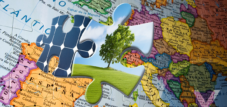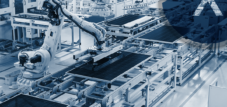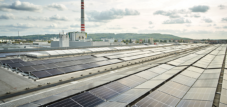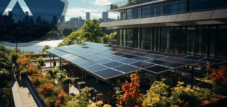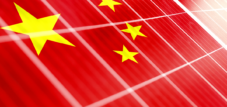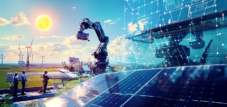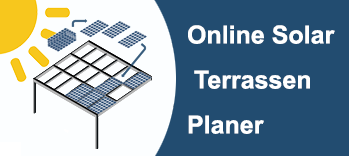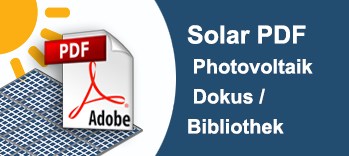Insolvency | Meyer Burger hires US production: crisis from the Swiss solar manufacturer is dramatic
Xpert pre-release
Language selection 📢
Published on: May 30, 2025 / update from: May 30, 2025 - Author: Konrad Wolfenstein

Insolvency | Meyer Burger hires US production: Crisis of the Swiss solar manufacturer is dramatic-creative image: Xpert.digital
Meyer Burger withdraws from the USA: What does that mean for the solar industry?
Future uncertain: Meyer Burger closes US plant and terminates employees
The Swiss solar manufacturer Meyer Burger Technology AG made a drastic cut on May 29, 2025 and fully stopped its solar module production in the USA. The company, which has been struggling with financial difficulties for years, was forced to close Arizona and released all 282 employees due to a lack of financial resources. This development marks another serious setback for the traditional company, which was originally founded in 1953 as a manufacturer of watch stone manufacturing machines and later specialized in the photovoltaic industry. The abrupt closure raises serious questions about the future viability of the entire company and could have far-reaching consequences for the German locations in Saxony and Saxony-Anhalt.
Current production setting and direct consequences
Meyer Burger made the decision on the immediate decommissioning of US production on Thursday evening, May 29, 2025, and informed about it in an official message from the Swiss headquarters in Thun. The work in Goodyear, Arizona, was designed for an annual production capacity of 1.4 gigawatt heterojunction solar modules and was still in the boom phase. Production was stopped immediately, and all 282 remaining employees received their dismissals. The company announced that the future of the location was completely open, which indicates a possible permanent closure.
The production facility in Arizona played a central role in Meyer Burger's international manufacturing strategy. In the work, the solar cells manufactured at the German location in Saxony-Anhalt were processed into finished solar modules. This division of labor between German cell production and American module production should help the company to benefit from the production incentives of the American inflation Reduction Act and to be positioned closer to the growing US solar market. The abrupt stop of this production not only interrupts this strategic supply chain, but also raises questions about the utilization and future of the German production locations.
Financial restructuring and creditor negotiations
Meyer Burger is currently in critical conversations on restructuring with an ad hoc group of representatives of bonds. At the center of the negotiations are two convertible bonds issued by the subsidiary MBT Systems GmbH, which are due in 2027 and 2029 for repayment and were guaranteed by Meyer Burger Technology AG. The company's financial situation is so tense that the creditors have already granted multiple amounts of payment for outstanding interest payments. In mid -May 2025, Meyer Burger received another postponement for the interest payments of both bonds for a few weeks after a deletion had previously been approved.
The precarious financial situation is also evident in the business figures: For 2024, Meyer Burger reported a temporary operational result before interest, taxes and depreciation (EBITDA) of minus 210.4 million Swiss francs, the equivalent of around 226 million euros. The turnover was just under CHF 70 million (approximately 75 million euros). The company openly admitted that the continued existence was "to a large extent uncertain" and depends on significant new financial resources and the successful implementation of the business plan. This assessment illustrates the existence -threatening dimension of the current crisis.
Strategic setbacks and customer losses
A crucial turning point in the recent company history was the loss of the largest customer in November 2024. The American solar developer de Shaw Renewable Investments (DESRI) terminated his framework contract with Meyer Burger with immediate effect. This five -year contract had provided for the purchase of solar modules with an output of up to five gigawatts and was a central mainstay for the financing and utilization of the work in Arizona. The elimination of this large order hit the company that was already trimmed and led to a sales panic on the stock exchange, in which the stock in the meantime lost two thirds of its value.
After the Disri termination, Meyer Burger tried to stabilize the situation with a secure bridging loan in December 2024, which should ensure the necessary stability for restructuring and possible new negotiations with DESRI. Despite these efforts, the company continued to rely on short -term bridging financing in spring 2025 in order to cover the liquidity requirement. The fourth extension of bridge financing underlines the continued financial instability of the company.
Task of other US expansion plans
In parallel to the closure of the module production in Arizona, Meyer Burger also gave up plans for a further expansion in the USA. The planned construction of a solar cell factory in Colorado with a capacity of two gigawatts was canceled. This decision was followed by an earlier adjustment in August 2024, when the original expansion plans for the solar cell factory were put on hold. The task of these projects marks the end of the company's ambitious US strategy, which aimed to significantly benefit from the American support measures for renewable energies.
Novel photovoltaic solution for reducing costs and saving time
More about it here:
Strategic failure: Meyer Burger and the challenge of the energy transition
Effects on German locations and jobs
The closure of the US plant raises serious questions about the future of the German locations of Meyer Burger, especially in Saxony and Saxony-Anhalt. The company operates a solar cell production in Thalheim in Saxony-Anhalt, which originally provided the solar cells for further processing in Arizona. With the elimination of this customer, the occupancy and economic justification of the German location is questioned. Meyer Burger had already introduced short -time work for around 300 employees in Thalheim in April 2025, officially due to lack of material.
The short -time work in Thalheim concerns employees who had previously worked around the clock in shift operation. Legal experts initially rated this measure as a temporary solution for bridging economic bottlenecks, but warned of a deterioration in the situation if the situation does not improve over several months. With the closure of the US location, the starting point has deteriorated dramatically, since an important buyer for the solar cells produced in Germany is eliminated.
Historical development of the German locations
The German activities of Meyer Burger go back to strategic acquisitions of insolvent solar companies. The company had already closed the largest solar module production in Europe in Freiberg in Saxony in spring 2024. This closure was part of an original strategy to largely shift production to the United States, which, however, had to be abandoned due to a lack of financing options. The current development shows that this revised strategy has also failed and the company may now face comprehensive realignment or even bankruptcy.
Market environment and competitive pressure
Meyer Burger has been fighting structural challenges in the solar industry for years, especially with cheap competition from China and overcapacity in the European solar market. Due to scale effects, lower production costs and state support, the Chinese manufacturers can offer solar modules at prices that are difficult to undercut for European and American producers. In the first half of 2024, this competitive situation led to a sale of solar modules from the warehouse at dumping prices, which caused further losses.
In addition to the price problems, depreciation and costs in connection with the stalling structure of US production led to further financial burdens. The company's turnover collapsed by almost 50 percent to CHF 69.6 million in the first half of 2024. This dramatic deterioration of the business situation illustrates the difficulty of operating profitably in an increasingly inexpensive Asian provider.
Technological positioning and product differentiation
Meyer Burger had tried to stand out from the competition by specializing in highly efficient heterojunction solar cells and modules. This technology promises higher efficiencies than conventional solar modules and should enable premium positioning in the market. Despite this technological differentiation, the company could not achieve the necessary market penetration and profitability in order to justify the high investment costs and operating expenses. The failed US expansion shows that even innovative technology alone is not sufficient to be successful in a prize-driven market.
Future prospects and takeover negotiations
Despite the dramatic situation, Meyer Burger is currently conducting talks with potential investors about the participation or a possible sale of the company. According to its own information, the management works with selected interested parties in order to have fully financed, binding offers as quickly as possible. These negotiations could be the last chance for the company to avoid bankruptcy and develop a sustainable future perspective.
However, the chances of success of such takeover negotiations are uncertain in view of the precarious financial situation and structural problems in the solar industry. Potential investors not only have to take over the existing debts, but also make significant additional investments in order to make the company competitive again. The fact that Meyer Burger has not yet submitted his annual report for 2024 - originally announced for April 15, 2025 and now planned for May 31 - makes a sound evaluation of the asset for potential investors.
Possible insolvency scenarios
If the restructuring negotiations and takeover talks fail, Meyer Burger is faced with likely bankruptcy. Experts had already warned of a “very large risk of bankruptcy” in September 2024 and classified the company according to the Altman Z score in the red area. Bankruptcy would not only mean the end of the traditional company, but also have a significant impact on the remaining jobs in Germany and further weaken the European solar industry.
Conclusions
The attitude of US production and the dismissal of 282 employees mark a critical turning point in the company history of Meyer Burger. The company, which was once traded as the hope of the European solar industry, is now faced with existential challenges that fundamentally question its future viability. The company has brought the company into a situation, which may no longer be a way out, the combination of intensive price pressure through Chinese competition, the loss of important major customers and repeated financing problems.
The effects of this development extend far beyond the company itself and affect the entire German and European solar industry. The possible collapse of Meyer Burger would further strengthen the dependence of Europe on Asian solar manufacturers and endanger strategic autonomy in an important future sector. At the same time, the case illustrates the difficulty of being successful in a globalized and strongly prize -driven market with local production, even if innovative technologies and government funding are available. The coming weeks will show whether a rescue of the company is still possible or whether Meyer Burger will enter history as a warning example of the challenges of the energy transition in Europe.
- Warehouses, production halls and industrial halls with their own power source from a photovoltaic roof system - Image: NavinTar|Shutterstock.com
- Industrial plant with its own power source from an outdoor photovoltaic system - Image: Peteri|Shutterstock.com
- Plan solar systems with photovoltaic solutions for freight forwarding and contract logistics
- B2B solar systems and photovoltaic solutions & advice
- Plan photovoltaics for warehouses, commercial halls and industrial halls
- Industrial plant: Plan a photovoltaic open-air system or open-space system
- Plan solar systems with photovoltaic solutions for freight forwarding and contract logistics
- B2B solar systems and photovoltaic solutions & advice
We are there for you - advice - planning - implementation - project management
☑️ Construction and advice on photovoltaic open-space systems
☑️ Solar park planning ☑️ Agri-photovoltaic implementation
☑️ Solar outdoor systems with dual-use solutions
Xpert.Solar is your ideal partner for the planning, consulting and construction implementation of ground-mounted photovoltaic systems and agricultural photovoltaic projects due to our many years of experience and expertise in the solar energy industry. Xpert.Solar has an experienced team of professionals that offers tailored solutions to farmers and investors. From location analysis to financial and legal advice to technical implementation and monitoring, Xpert.Solar supports its customers professionally and reliably to ensure successful and sustainable implementation.
I would be happy to serve as your personal advisor.
You can contact me by filling out the contact form below or simply call me on +49 89 89 674 804 (Munich) .
I'm looking forward to our joint project.
Xpert.Digital - Konrad Wolfenstein
Xpert.Digital is a hub for industry with a focus on digitalization, mechanical engineering, logistics/intralogistics and photovoltaics.
With our 360° business development solution, we support well-known companies from new business to after sales.
Market intelligence, smarketing, marketing automation, content development, PR, mail campaigns, personalized social media and lead nurturing are part of our digital tools.
You can find out more at: www.xpert.digital - www.xpert.solar - www.xpert.plus




